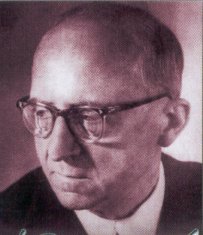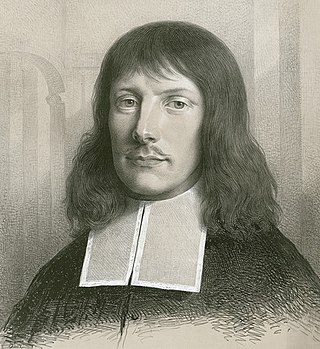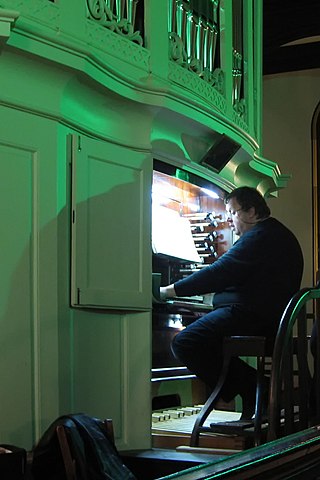
Peter Schreier was a German tenor in opera, concert and lied, and a conductor. He was regarded as one of the leading lyric tenors of the 20th century.

The Thomanerchor is a boys' choir in Leipzig, Germany. The choir was founded in 1212. The choir comprises about 90 boys from 9 to 18 years of age. The members, called Thomaner, reside in a boarding school, the Thomasalumnat and attend the St. Thomas School, Leipzig, a Gymnasium school with a linguistic profile and a focus on musical education. The younger members attend the primary school Grundschule Forum Thomanum or Anna-Magdalena-Bach-Schule. Johann Sebastian Bach served as Thomaskantor, director of the choir and church music in Leipzig, from 1723 to 1750.

Kurt Georg Hugo Thomas was a German composer, conductor and music educator.

Jesu, nun sei gepreiset, BWV 41, is a church cantata by Johann Sebastian Bach. He composed the chorale cantata in Leipzig for New Year's Day and first performed it on 1 January 1725 as part of his second cantata cycle. It is based on the hymn by Johannes Hermann (1591).

Georg Christoph Biller was a German choral conductor. He conducted the Thomanerchor as the sixteenth Thomaskantor since Johann Sebastian Bach from 1992 to 2015. He was also a baritone, an academic teacher, and a composer. Active as Thomaskantor after the German reunification, Biller returned the Thomanerchor to its original focus on church music. He was instrumental in the new buildings for the choir's boarding school, the Forum Thomanum, and in the celebration of its 800th anniversary in 2012.
Hans-Joachim Rotzsch was a German choral conductor, conducting the Thomanerchor from 1972 until 1991 as the fifteenth Thomaskantor since Johann Sebastian Bach. He was also a tenor and an academic teacher.

Erhard Mauersberger was a German choral conductor who conducted the Thomanerchor as the 14th Thomaskantor since Johann Sebastian Bach. He was also an academic teacher and composer.
Adele Stolte was a German soprano singer in concert and Lieder, and an academic voice teacher.

Johann Sebastian Bach composed the church cantata Ich armer Mensch, ich Sündenknecht, BWV 55, in Leipzig for the 22nd Sunday after Trinity and first performed it on 17 November 1726.

Johann Sebastian Bach composed the church cantata Lobe den Herren, den mächtigen König der Ehren, BWV 137, in Leipzig for the twelfth Sunday after Trinity and first performed it on 19 August 1725. The chorale cantata is based on the hymn by Joachim Neander (1680).

Was mein Gott will, das g'scheh allzeit, BWV 111, is a cantata by Johann Sebastian Bach for use in a Lutheran service. He composed the chorale cantata in Leipzig in 1725 for the third Sunday after Epiphany and first performed it on 21 January 1725, as part of his chorale cantata cycle. It is based on the hymn by Albert, Duke of Prussia, published in 1554, on the topic of the Christian's acceptance of God's will.

Also hat Gott die Welt geliebt, BWV 68, is a cantata by Johann Sebastian Bach, a church cantata for the second day of Pentecost. Bach composed the cantata in Leipzig and first performed it on 21 May 1725. It is one of nine cantatas on texts by Christiana Mariana von Ziegler, which Bach composed at the end of his second annual cycle of cantatas in Leipzig. In a unique structure among Bach's church cantatas, it begins with a chorale and ends with a complex choral movement on a quotation from the Gospel of John. Bach derived the two arias from his Hunting Cantata.
Martin Lattke is a German tenor, performing as a soloist and former member of the ensemble amarcord.

Matthias Eisenberg is a German concert organist and harpsichordist, and a cantor. The award-winning player is known for performing concerts with clarinetist Giora Feidman. He has performed and conducted master classes internationally. He recorded, including the complete organ works by J. S. Bach and improvisations, and has conducted Bach cantatas from the harpsichord in collaboration with the Thomanerchor.
Martin Krumbiegel is a German classical tenor, conductor and musicologist. A member of the Thomanerchor as a boy, he is mostly active in oratorios, cantatas and vocal chamber music of the 17th and 18th century. Krumbiegel has been the conductor of the Leipziger Oratorienchor since it beginning in 1993, and of ensembles such as Fidicianan and Vox Humana. He is professor of musicology at the University of Music and Theatre Leipzig.
Wolfgang Unger was a German conductor, especially a choral conductor, and an academic in Halle and Leipzig. He founded several choirs and focused on the music of Johann Sebastian Bach and his contemporaries. Like Bach, he directed the music at the University of Leipzig, called Leipziger Universitätsmusik.
Gerda Schriever was a German contralto in oratorio and recital, and an academic teacher. She appeared for decades with the Thomanerchor in Leipzig, also recording and for broadcast. She appeared at international festivals. Schriever was an academic voice teacher at the University of Music and Theatre Leipzig.
Bach composed Wie schön leuchtet der Morgenstern, BWV 1, as chorale cantata for the Marian feast of the Annunciation, for a first performance in a church service in Leipzig on 25 March 1725. The cantata, for soprano, tenor and bass soloists, four-part choir and Baroque orchestra, takes around 25 minutes to perform.
Regina Werner-Dietrich is a German operatic soprano and vocal pedagogue. She is professor emerita of classical singing at the University of Music and Theatre Leipzig.

Andreas Reize is a Swiss organist and conductor, with a focus on opera and choral conducting. He was appointed Thomaskantor on 11 September 2021, becoming the 18th director of music to take charge of the world famous Thomanerchor at Leipzig in succession to Johann Sebastian Bach.












